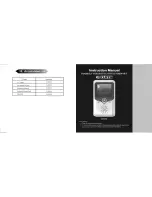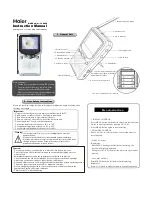
26 | Westinghouse Portable Power
WARNING
Before attempting to service or troubleshoot the generator, the owner or service technician must first read the owner’s
manual and understand and follow all safety instructions. Failure to follow all instructions may result in conditions that can
lead to voiding of the EPA certification or product warranty, serious personal injury, property damage or even death.
TROUBLESHOOTING
PROBLEM
POTENTIAL CAUSE
SOLUTION
Engine is running, but no
electrical output
1. Circuit breakers are tripped.
1. Reset the circuit breakers and check
for overload condition.
2. The power cord’s plug connector is not
fully engaged in the generator’s outlet.
2. Verify plug connector is firmly engaged
in the generator’s outlet. If using the
240V outlet, make sure plug connector
is rotated 1/4 turn in the clockwise
direction.
3. Faulty or defective power cord
3. Replace power cord.
4. Faulty or defective electrical appliance
4. Try connecting a known good
appliance to verify the generator is
producing electrical power.
5. GFCI outlet is tripped
5. Press the reset button on the GFCI
outlet.
6. If trying 1-5 above does not solve the
problem, the cause might be the generator
has a fault.
6. Take the generator to your nearest
authorized service dealer.
STORING GENERATOR
WARNING
Never store a generator with fuel in the tank
indoors or in a poorly ventilated area where the
fumes can come in contact with an ignition source
such as a: 1) pilot light of a stove, water heater,
clothes dryer or any other gas appliance; or 2)
spark from an electric appliance.
NOTICE
Gasoline stored for as little as 60 days can go bad, causing gum,
varnish and corrosive buildup in fuel lines, fuel passages and the
engine. This corrosive buildup restricts the flow of fuel, preventing
an engine from starting after a prolonged storage period.
Proper care should be taken to prepare the generator for
any storage.
1.
Make sure the Engine Switch is switched to
STOP
so
the generator does not draw power from battery.
2.
Clean the generator as outlined in
Cleaning the
Generator
.
3.
Drain all gasoline from the fuel tank as best as
possible.
4.
With the fuel shut off valve open, start the engine
and allow the generator to run until all the remaining
gasoline in the fuel lines and carburetor is consumed
and the engine shuts off.
5.
Close the fuel shut off valve.
6.
Drain the remaining gas in the carburetor float bowl
outlined in
Draining Carburetor Float Bowl
on page 21.
7.
Change the oil (see
Changing Engine Oil
on page 23).
8.
Remove the spark plug (see
Spark Plug Maintenance
on page 24) and place about 1 tablespoon of oil in the
spark plug opening. While placing a clean rag over
the spark plug opening, slowly pull there coil handle
to allow the engine to turn over several times. This
will distribute the oil and protect the cylinder wall from
corroding during storage.
9.
Replace the spark plug (see
Spark Plug Maintenance
on page 24).
10.
Move the generator to a clean, dry place for storage.
MAINTENANCE
Summary of Contents for WGen5500
Page 1: ...USER MANUAL WGen5500 Portable Generator 5500 Running Watts 6850 Peak Watts...
Page 8: ...8 Westinghouse Portable Power SAFETY SAFETY LABELS AND DECALS 8 9 7 10 8 9 6 6 7 5 10...
Page 32: ...32 Westinghouse Portable Power WGen5500 SCHEMATIC...
Page 34: ...34 Westinghouse Portable Power Version 07 23 18KD...









































